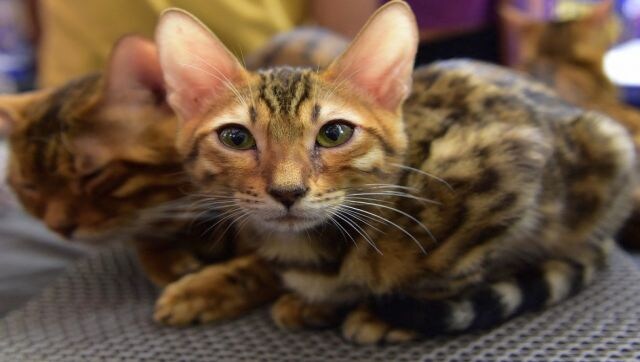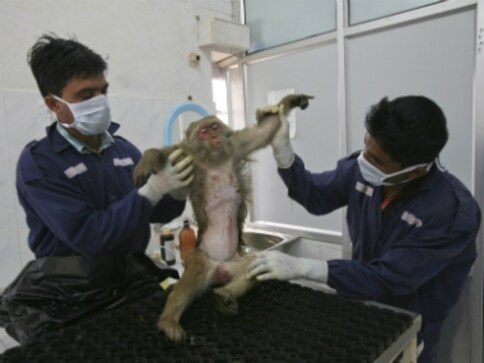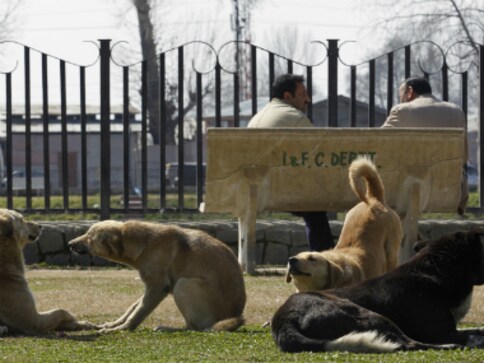Feline Felons: How a former British cop and partner made £280,000 by selling sick and dying cats to customers
Former British Transport Police officer Amy Byrne and partner, Harry Angell, have been sentenced to three years in jail for running a cat scam. They would buy sick kittens as cheap as £50 (Rs 5,150) and then sell them for £1,500 (Rs 1.5 lakh) – earning over £280,000 (Rs 2.8 crore) over the years

former British Transport Police officer Amy Byrne and her partner, Harry Angell have been selling sick or dying cats to customers as far back as 2015. Image used for representational purposes/AFP
Scams happen all the time – in India and across the world. There was the one where consumers were tantalised by claims that an energy-saving device could cut their electricity bills by ‘up to 90 per cent’. There was the other instance when a man in the US raised millions of dollars by telling investors that the money was going to be used to host Christian music festivals
But this one is really catty. A couple in Thamesmead, London have been caught and jailed for selling sick and dying kittens in a twisted £280,000 (Rs 2.87 crore) scam.
Here’s what we know about this UK shocker.
Related Articles
The cat scammers
Last week, the Woolwich Crown Court found former British Transport Police officer Amy Byrne and her partner, Harry Angell, guilty of a cat scam and sentenced the former to three years and eight months to jail while the latter will have to spend the next three years and four months of his life in prison. The court has also disqualified them from owning pets with no appeal for 10 years.
The couple, it has been found, used to buy kittens for just £50 (Rs 5,154) and then sell them for £1,500 (Rs 1.5 lakh). However, when customers received their new pets, many found they were desperately malnourished, ill and covered in their own urine or faeces.
Investigations revealed that the two of them used 33 different fake names, including the genuine charity Cat Cuddles Rehoming to advertise the sale of these cats. The court was told that Byrne use to lie to buyers that she was a veterinarian and that the kittens had been wormed and microchipped. The health certificates she provided also turned out to be fake.
Complaints against Byrne and Angell date back to 2015 and in 2021, investigations were launched against them following which a search was conducted at their house. There were 17 kittens at their house and a vet judged that six of them were suffering. The six were confiscated and one died a short time later.

One of the victims told the court, “Having recently lost a cat to the road, we were so looking forward to giving a home to a new kitten. We instantly fell in love with Elsa who was so sleepy and cuddly when we got her. For the two precious weeks we had her in our lives she became part of our family.”
Another victim had said that she arranged to buy a male kitten from the couple as a surprise for her autistic son. However, after receiving the cat from Byrne she realised that the kitten was a female, thin and even had faeces stuck in her fur. The poor feline died a short while later.
A DailyMail report revealed that Angell confirmed that the kittens had not seen a vet as he didn’t agree with veterinary practices.
The Royal Society for the Prevention of Cruelty to Animals (RSPCA) prosecutor Hazel Stevens said in court, “There were human and animal victims in this. Humans were at risk of getting these illnesses from the cat.”

Byrne was still employed as a British Transport Police officer while she committed these crimes. She was removed from the force in January 2023 after a misconduct investigation. That probe had revealed a hydroponics tent, two cannabis plants, bag of cannabis, half smoked joint and pack of cannabis seeds at her residence.
After the sentencing, RSPCA inspector Kirsten Ormerod was quoted as saying, “Welcoming a pet into their homes should have been a positive experience, but for many of them it resulted in large vet bills to try and save their brand new, poorly kitten, and for some, having them die within hours before their eyes – which will have been a devastating experience.
“We also thank the Metropolitan Police and London Borough of Bexley Council for their vital role in this investigation.”
Pet scams on the rise
This isn’t the first time scammers have used animals to make a quick buck. Ask people around you and there’s a big chance that someone has been conned out of their money after being wooed to buy a cute pup or cat online.
In 2020, the Better Business Bureau (BBB) in America reported that the number of pet scams had more than doubled during the COVID-19 pandemic. It found that in the year, victims had lost more than $3 million (Rs 24 crore). That’s more than six times greater than the total losses reported just three years ago.
In Australia too, the number of pet scams are significantly rising. The Australian Competition and Consumer Commission (ACCC) reported in 2022 that losses from pet scams increased more than 1,000 per cent in the past two years. Losses were just over $375,000 in 2019 but rose to more than $4.2 million in 2021.

A similar trend was reported from the United Kingdom. The Nationwide Building Society, a mutual financial institution, said that the number of purchase and advance fee scams involving pets rose by 39 per cent between 2020 and 2021. Additionally, a survey carried out by them found that nearly three in ten (29 per cent) admitted they have been or know someone who has been the victim of a pet scam. This rises to 45 per cent of those aged 16 to 24 and nearly a third (31 per cent) of 25 to 34s.
Also read: Furry Worries: People are abandoning their dogs and cats. Inflation is responsible
Experts state that the pandemic provided a perfect chance for such activity to boom as more people were feeling isolated and sought pets to give them emotional connection. That meant fewer genuine pets were available at the same time as lockdown-imposed travel restrictions meant people couldn’t do as they normally do, visiting pets in person before buying them.
And shockingly it’s not just the common man across the world that falls for these cons. In March 2017, India’s former minister and current senior Congress leader Salman Khurshid was duped of Rs 59,000 in an online pup scam. According to news agency PTI, Khurshid had tried to buy a pedigree Maltese puppy on a website that was offering them for cheap.
So, next time one thinks of buying a pet, ‘paws’ for thought.
With inputs from agencies
Read all the Latest News, Trending News, Cricket News, Bollywood News,
India News and Entertainment News here. Follow us on Facebook, Twitter and Instagram.
also read

Veterinary education and practices in India are in dire need of change
Veterinary education and practices in India have undergone sweeping changes. There are hundreds of pending issues, including amending the sizes of battery cages for chickens to making minimum standards for all the hideous rotting government veterinary hospitals in the country.

Animal cruelty shouldn't be seen with 'us versus them' lens; all life has inherent, equal rights
People who would limit moral standards only to humans are guilty of the same prejudice that make racism and sexism objectionable.

Decoding animal myths vs reality: How language desensitises us to their suffering
Helping an animal is about attitude and a value system. We can examine our treatment of fellow creatures by our language.


